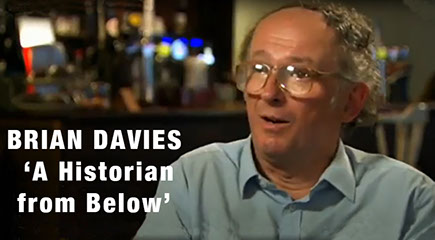

Pic: Brian in dialogue with Michael Sheen at the Welsh Oak (BBC 2015)
Editorial: Brian Davies
‘A Historian from Below’
“Too often Dr William Price is presented as an exotic and eccentric, even mad, figure and no attention is given to the Chartist years of his life. At best, it’s only his innovative act of cremation that is given serious attention. Expect different from Brian, who since his student days has enthusiastically championed Price and explained his intelligence, complexity, social humaneness, polymath interests and above all, his revolutionary politics.”
That was my advance publicity in CHARTISM eMAG no 7 for the Annual Chartist Lecture at Merthyr, October 2014. This was around the time Brian retired from his curatorship at Pontypridd Museum. He had just marked this ‘rite of passage’ at the Pontypridd seminar held that 20th September, delivering a succinct paper concerning Price’s ‘druidic persona’. He demonstrated how Price had not only derived his ideas directly from Iolo Morganwg, but also importantly from careful study of the books that had influenced Iolo.
As well as inventing the Gorsedd, Iolo created a Welsh version of the ‘Norman Yoke’ theory of history propounded by English radicals – a myth that the Norman conquest had done away with a highly democratic Saxon ‘polis’. As the Saxon past has no existence in Welsh history, Iolo and Price went back further into the mists of prehistoric time to find their democratic Utopia. In Brian’s words they “knew that if people have been taught for generations that they are a subordinate people, of no account in the great pageant of history, then in order that they can muster the courage to attempt to shape their own future they must first be given a version of history which inspires some self-confidence.”
Truly unique and very much admired throughout south Wales, Brian was always challenging accepted ‘history’ norms and he constantly thought ‘outside the box’. His sympathies were consistently with the ‘underdog’. His sincerity and his academic rigour are indisputable. Brian was taught to question evidence “till the pips squeaked!” to quote a politician he surprisingly liked. He thought Dennis Healey was a man with a ‘hinterland’. Brian was certainly such a person. His interests never ceased to surprise us.
A pupil of Mountain Ash Grammar School in the 1960s, he already proudly viewed history from the ‘bottom up’ from his family’s working class roots. He chose to study where ‘History from Below’ was valued. At the new, and then non-traditional, University of York (1970-73), he crossed the path of Gwyn Alf Williams from Dowlais, and metaphorically supped with Gramsci and his Marxian analysis. Brian regularly quoted Gwyn Alf’s mantra « Always challenge, challenge and keep on challenging ». This experience gave him a keen eye for unexpected historical sources, drawn from a broad spectrum.
The 1970s was the time of ‘New Histories’, many of which were drawing on the analytical methodology used by the much earlier French Annales School of History, which encompassed ‘total’ evidence, the socio-cultural, as well as economic factors and political events. At York, he learned to value material and landscape evidence. After a brief time in postgraduate research at University College, Swansea under the tutelage of David J. V. Jones, labouring in the ‘fields’ of early nineteenth century Welsh protest, he found his feet in the museum world - at the National Museum of Wales, Big Pit in Blaenafon and at Pontypridd Museum.
In retirement, he volunteered to take the ‘hands on’ challenge of running the Trust at Hetty Colliery, purchased and restored an old steam powered launch at Penarth Marina and gathered a personal collection of miners’ lamps.
Over the years, Brian developed a profound understanding of oral tradition and its importance in developing collective ‘mindsets’. Through his articles, and his ever ready willingness to lecture regularly to local societies, he played a vital role in the rehabilitation of Iolo Morganwg and Dr William Price from the oblivion they were previously assigned by the Welsh establishment. He never ceased to stress the influence that they both had upon popular radicalism and national consciousness in south Wales. There is still some way to go with this journey; has either yet achieved rounded portrayal in school history teaching or popular imagination?
Brian made outstanding contributions to Chartist studies in Wales and as the years pass, his influence will continue, not wane, as long as we revisit his writings. Brian was always writing. There must be more to publish.
LES JAMES Editor
Brian Davies – bibliography
‘Empire and Identity: the ‘case’ of Dr. William Price’ pp. 72-93 in A People and A Proletariat: Essays in the History of Wales 1780-1980, edit. David Smith, Pluto Press & Llafur (1980).
‘Evan James, Dr William Price and Iolo Morganwg’s Utopia’, Gelligaer
Journal, no, 17 (2009). Also in Merthyr Historian, no. 26, pp. 73-84,
(2014).
‘Memories of Gwyn at York’ – contribution to the Professor Gwyn A.
Williams Symposium, Merthyr Historian, no. 26, pp. 281-290, (2014).
‘Dr William Price and Merthyr’s Political History’ Merthyr Historian, no. 27, pp. 9-25, (2015).
‘The Chartists of Llanfabon and Gelligaer’, Gelligaer Journal, no. 24, p.42-53, (2017).
Tribute to the historian, Ivor Wilks – ‘A Man with a Hinterland’, Chartism eMagazine, no. 14, (2018).
‘The Newport Chartists Revisited’ – A Review of Two Books: I. Wilks 1984 and D.J.V. Jones 1985. Planet, 51 (June-July 1985), republished in Chartism eMagazine, no 14, (2018).
Review of ‘A Welsh Heretic, Dr. William Price, Llantrisant’ T. Islwyn
Nicholas (1940) in Chartism eMagazine, no. 23, (2022).
Brian Davies looks at the complex relationship of Slavery and Wales and Asks – “Should we Take Down Monuments or Put Up Some More?” Chartism eMagazine, no 19, (2020).









